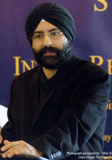|
February 2004

|
Arvind-Pal Singh Mandair is currently holder of the Sardarni Kuljeet
Kaur Bindra Endowed chair in Sikh Studies and Assistant Professor of
Philosophy and Religion at Hofstra University, New York.
Born in the Hoshiarpur district of Punjab, at the age of three Arvind-pal Singh migrated to England with his parents in the mid
1960’s. He was educated at King Henry VIII, one of England’s oldest
grammar schools, going on to study Applied Chemistry at Coventry
University where he took a B.Sc. with First Class Honours, followed
by graduate work at the University of Aston in Birmingham where he
earned a PhD specializing in the application of magnetic resonance
spectroscopy to the study of silicates. His early work was published
in leading journals such as Polyhedron: International Journal of
Inorganic and Organometallic Chemistry, and Inorganica Chimica Acta.
During the late 80’s Dr. Mandair held posts with several
multi-national companies and as Post Doctoral Fellow at the
University of Warwick’s Department of Physics where he worked on the
synthesis of Superconductors.
Whilst employed at the University of Warwick during the early 90’s
Dr. Mandair developed a strong interest in the study of his cultural
tradition, fuelled partly by his extensive voluntary work within the
British Sikh community at grass-roots level. Much of this work took
the form of developing intellectual awareness and capacity building
amongst second-generation Sikhs through public engagements, lectures
and the publication of a new magazine called the Sikh Reformer
(1990-1995) which sparked considerable debate and response among
British Sikh students.
During the mid-90’s he completed an intellectual transition from
science to the humanities by retraining in modern European
philosophy, cultural theory and theology but with a specific
orientation towards Sikhism and Indian religions. He took a Masters
degree in Philosophy (with Distinction) in 1994 followed by a PhD in
1998 both from the University of Warwick. His PhD dissertation,
entitled “Thinking Between Cultures: Metaphysics and Cultural
Translation”, explores the emergence of Sikh theological
hermeneutics in the late 19th and early 20th centuries and its
connections to identity formation amongst the contemporary Sikh
Diaspora.
His first teaching post in the humanities was at Coventry University
in 1998 where he taught Sikh history and religion. This was followed
by a post as Post-Doctoral Fellow at the University of London’s
School of Oriental and African Studies where he taught Sikhism and
co-organized a major international conference on the theory of
dialogue called “Dialogue and Difference”. During the week of 9/11
he migrated to New York with his family in order to take up his
current position at Hofstra University. At Hofstra he teaches an
introductory course on Sikhism as well as an advanced level course
on Sikh Mysticism which will be soon be run as a one-week
residential seminar available for the wider Sikh community. He also
teaches upper level courses in Indian Religions and is developing
theoretical courses that explore the interface between Indian
religions, post-modern and post-colonial thought.
Dr. Mandair’s recent publications include the co-edited volume Sikh
Religion, Culture and Ethnicity. He is currently completing several
book projects including two monographs (Religion and the Politics of
Translation, forthcoming Manchester University Press and Theology
and Cultural Translation: Revisioning Sikh Experience forthcoming
Ashgate Publishing), a new set of translations from the Sikh
scriptures entitled Hymns of the Sikh Gurus (co-translated with
Christopher Shackle, forthcoming with Routledge) and an edited
volume in cultural theory entitled Dialogue and Difference. His
current research interests focus on exploring the intersections
between religion and comparative cultural theory and rethinking the
relationship between mysticism and politics in Indic religions. He
has organized and co-organized many international conferences in
Sikh studies amongst them Sikh Identity in Transition (University of
Warwick 1991), New Perspectives in Sikhism (SOAS 1998) Commemorating
the Khalsa (Coventry University 1999), Dialogue and Difference (SOAS
1998), Sikhism and Critical Theory (Hofstra University 2002). In May
2004 he will be hosting a conference that explores Memory and Trauma
in Recent Sikh and Punjabi Experience.
Dr. Mandair’s hobbies include tennis, squash and soccer. He lives on
Long Island with his wife Preet and his two children Aman-vir Singh
and Sukhmani Kaur.
|

